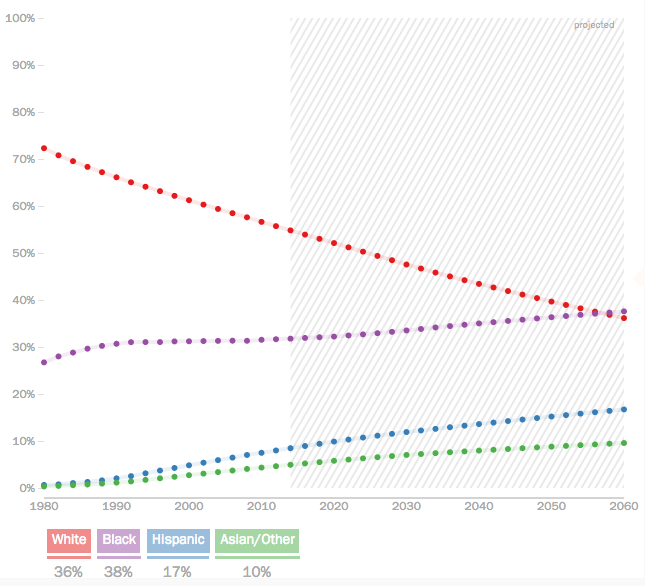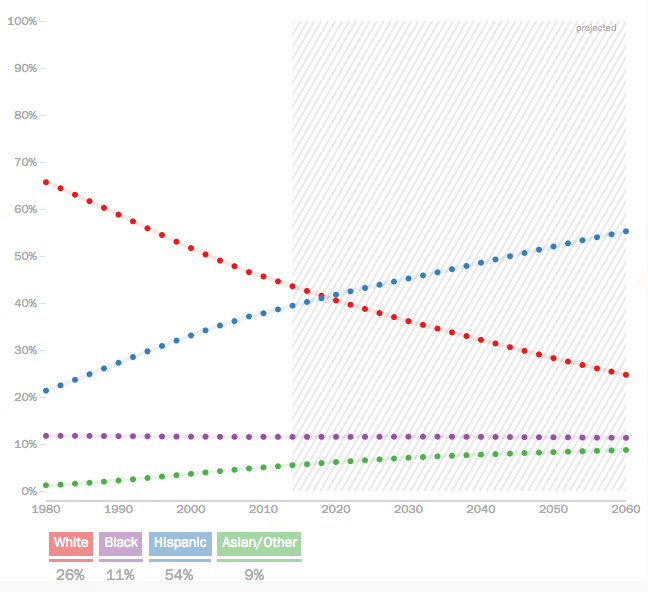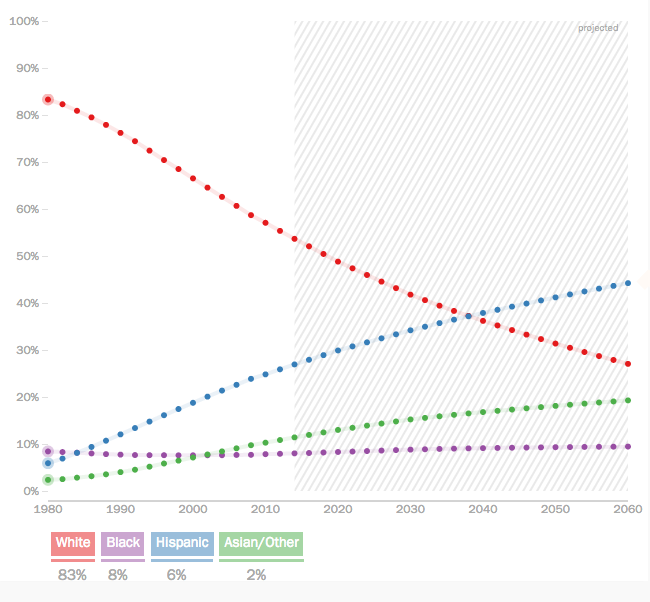Connecting state and local government leaders
The new “States of Change” report documents dramatic shifts in America’s demographic future.
Is the United States becoming a majority-minority nation?
An important new demographic analysis released last week by three Washington, D.C.-based think tanks—the Center for American Progress, the American Enterprise Institute and the Brookings Institution—suggests that reality is not too far away. And in some places, it’s already arrived.
With intermarriage and assimilation, it’s difficult to define precisely what might constitute a “majority” racial composition in the decades ahead. But people of purely white heritage are certainly destined to decline below the 50 percent mark by the mid-2040s given current trends.
More interesting than nationwide trends are dichotomies among the states revealed by the new “States of Change” report, whose most distinctive consists of interactive maps charting demographic shifts state by state from 1980 to the present and a projected future extending to 2060. The report’s authors, Ruy Teixeira, William H. Frey and Robert Griffin, are longtime students of demographic and political trends.
Clicking through the data on any state reveals evolving characteristics of its population by racial composition, age groups, generations, voting eligibility, marital status and educational attainment. For elected officials, the report charts the future of trends they’re already seeing in composition of the electorates who vote them in—or out—of office. For other officials, the data suggest what kinds of services might most be needed as their states, cities and counties change over time.

Above: The "States of Change" report shows that in 2060, black residents will outnumber white residents in Georgia.
Take Georgia as one example. White residents now comprise 55 percent of the population, but they will command only 49 percent by 2026. The black population of Georgia is growing, thanks in part to migration from northern states. Now at a one-third share, it is expected to grow to 38 percent by 2060. Hispanics and the Asian/other categories are growing as well. But Georgia is already a majority-minority state in its school population, where white residents today comprise 46 percent of students, lower than the combined black-Hispanic population of 48 percent.
In Texas, whites attained minority status a decade ago, and today, the fast-growing Hispanic population is up to 39 percent. Three other states are now majority-minority: California, New Mexico and Hawaii, and another nine have between 40-50 percent minority populations.

Above: According to the "States of Change" report, in 2056, the Hispanic population in Texas will comprise more than half of the state's total population.
Nevada is witnessing among the most dramatic shifts in the racial composition of its population: from 83 percent white in 1980 to 54 percent today and a projected 27 percent in 2060.

Above: According to the "States of Change" report, in 1980, white residents made up 83 percent of the state's total population. By 2060, Nevada's white residents are expected to comprise just 27 percent of the total.
Age offers another interesting dimension of the study. Seniors’ migration to Florida will accelerate in the years the come the study projects, rising from today’s level of 37 percent in the over-50 category to 41 percent by 2060. Over the same period, the Sunshine State’s younger population, aged 0-30, will decline by 10 percentage points, to 35 percent. And, as elsewhere in the country, marriage is on the decline in Florida, from 67 percent of adults in 1980 to 53 percent today—matching the national trend.
Among observations made by political consultants, pollsters and demographers who spoke during a Feb. 23 conference about the report, were these:
- Minorities are highly concentrated in urban districts. Thus President Obama won in 2012 with fewer counties than any candidate in the past 100 years. But this dynamic works against the Democrats in House elections. Whites are above the national average in 263 of the 435 House districts, and working-class whites without a college degree, still a substantial majority of the white population, are heavily Republican.
- Thus Democrats cannot win enough congressional districts to gain a majority in the House of Representatives, while Republicans cannot win enough minority votes to win the White House. The popular vote in five of the previous six presidential elections has gone to the Democrats.
- Republicans must find a way to win over minority voters if they hope to regain the White House. Florida’s Marco Rubio and Jeb Bush might be transformational candidates to that end.
- As to the role of government, demographic shifts are pointing toward a more sympathetic view in the American public. On issues like taxes, the social safety net, the minimum wage, inequality and infrastructure, minorities and the big millennial generation take a more activist view than whites and older generations.
- Yet, as Republican pollster Whit Ayers observed, those who tend to favor a larger government providing more services lose much of their enthusiasm if asked whether they also support higher taxes needed to pay for them.
- It’s possible that assimilation and intermarriage will gradually render the racial/ethnic “majority-minority” dichotomy less and less relevant. That’s what happened as the country assimilated huge numbers of Italians, Irish, and central Europeans who immigrated between 1850 and 1920. In recent years, intermarriage rates have ticked up substantially.




